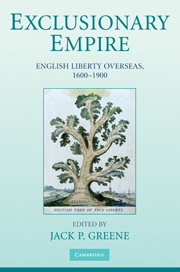Book contents
- Frontmatter
- Contents
- Notes on Contributors
- Preface
- Introduction
- 1 The Languages of Liberty in British North America, 1607–1776
- 2 Liberty and Slavery
- 3 “Era of Liberty”
- 4 Liberty and Modernity
- 5 Federalism, Democracy, and Liberty in the New American Nation
- 6 Liberty, Order, and Pluralism
- 7 Contested Despotism
- 8 “… a bastard offspring of tyranny under the guise of liberty”
- 9 How Much Did Institutions Matter?
- 10 The Expansion of British Liberties
- Index
10 - The Expansion of British Liberties
The South African Case
Published online by Cambridge University Press: 05 June 2012
- Frontmatter
- Contents
- Notes on Contributors
- Preface
- Introduction
- 1 The Languages of Liberty in British North America, 1607–1776
- 2 Liberty and Slavery
- 3 “Era of Liberty”
- 4 Liberty and Modernity
- 5 Federalism, Democracy, and Liberty in the New American Nation
- 6 Liberty, Order, and Pluralism
- 7 Contested Despotism
- 8 “… a bastard offspring of tyranny under the guise of liberty”
- 9 How Much Did Institutions Matter?
- 10 The Expansion of British Liberties
- Index
Summary
It is a natural or at any rate an expectable thing that colonists who have emigrated from a mother-country to settle in new lands, but remain attached to their mother-country after their emigration, should carry with them a stock of political ideas, and should preserve and even expand that stock – partly because it is in their blood; partly because it is kept intact by continuing association with the mother-country; and partly because the new conditions of colonial life demand new responses which are found most naturally in new applications of old ideas. The colonists will vindicate the rights and liberties of the mother-country as their rights and liberties; they will even, in the free and bracing air of colonial conditions and colonial enterprise … attempt to carry these rights and liberties to a farther point and a higher reach than they have attained in the mother-country.
The transmission of British ideas about liberty, consensual governance, and the rule of law to South Africa is a neglected topic. This is at first sight surprising, given the importance of those ideas in South Africa today, but both British rule and liberalism have taken hard knocks in recent South African historiography, which has tended to be critical of the British role in southern Africa as highly illiberal. This is not because such historiography accepts the view, expressed by a leading Afrikaner in a propaganda tract on the eve of the Anglo-Boer war of 1899–1902, that the preceding century had been a “Century of Wrong” done by the British to the Boers, though some writers still subscribe to less extreme variants of that proposition.
- Type
- Chapter
- Information
- Exclusionary EmpireEnglish Liberty Overseas, 1600–1900, pp. 269 - 288Publisher: Cambridge University PressPrint publication year: 2009
- 2
- Cited by

